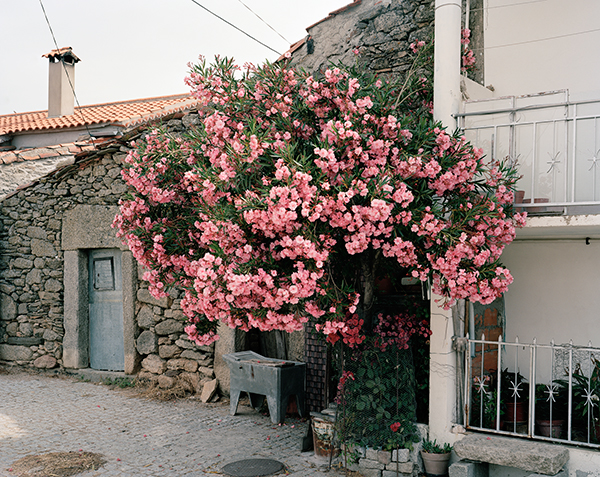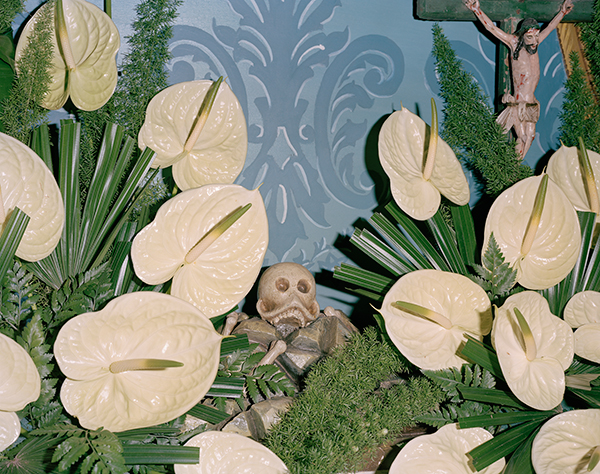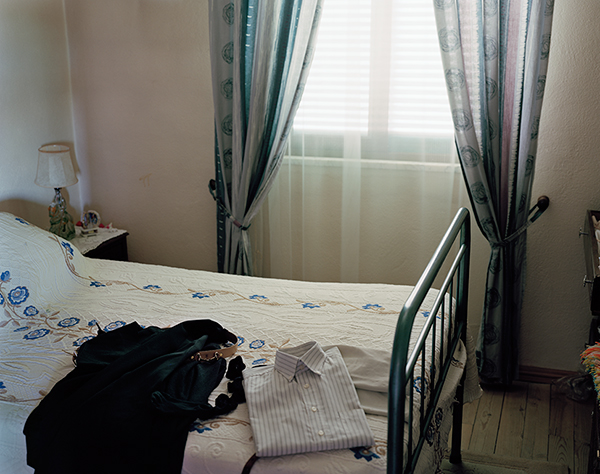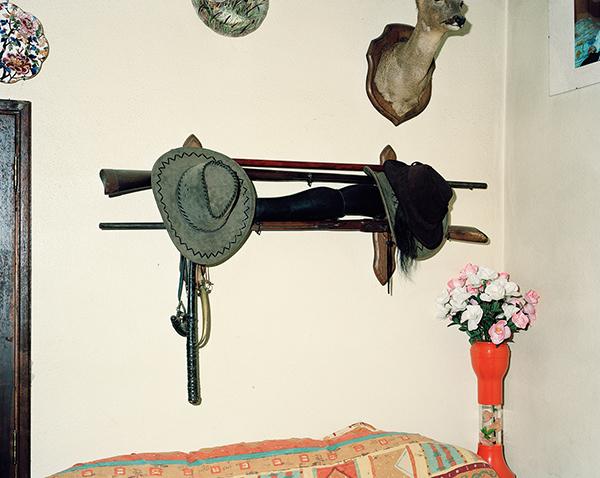There are things that can’t be written about as they have been in the past. Something changes. First the eyes, then the heart – or senses, or whatever our ancestors called the soul – and, finally, the hands.
*
The first notes I take are about a man who was born, grew up, worked, was married, had a daughter, grew old, and died in the same village. These notes are not actually about the man, or his life, but about his death. They go like this:
Life in this house and with this family takes place entirely in this ground-level room, which is pleasingly dark and cool, and where there is a stove, a large table, an escanho – a long wooden bench common to Trás-os-Montes – and a door that leads to the pantry where they keep their produce.
It was April, the fireplace was not lit, but it was beside the fireplace that the man would often tell stories and where, all of a sudden full of life, he told stories that night. He said goodbye to his family – his daughter and granddaughter had come from the city. He said goodnight. He reminded the woman he’d been married to for sixty years to take her medicine.
The village where the man was born, grew up, worked, was married, had a daughter, grew old, and died is quaint, with its sculpted cross and renovated stone houses. It is tidy, clean. Quiet and very empty. It resembles a museum.
The widow, black shawl and unreadable face, moves slowly, bent by arthritis. She walks the streets like a shadow. She knows she is living the end of an era, of a way of life. When we are all gone, she says – meaning the old people – the shadows, the deserted houses will fall, slowly, and there will no longer be a village.
*
‘We have a great history, the best weather in the world, and the best people in the world,’ says a listener on the radio. ‘We will raise our country up.’
The road runs on, spent. Old paths and, in the distance, the border. More and more, I have the feeling of being on an island. It was easier to get here than it will be to leave.
*
A.’s house or place of rest: an unmade bed, a cluttered bedside table, a radio, dirty laundry; a sheet hung from a rope separates the toilet from the rest of the room, whose floors and ceiling are bare.
A., or a man simply passing through life: parka, baseball cap, cheeks ruddy from drinking, steady eyes, hands rolling a cigarette, gauze covering the lower half of a face wrecked by cancer.
*
Survival guide:
- Stop. Listen to the beating of your heart. Look out at the wild cherry trees laden with fruit.
*
The swallows have already built their nests above the back door; this is how, every year, H. notices the coming of spring. They are useful birds, and beautiful, and have always been a favorite of his. But now he watches them as he never has before, because he might not see another spring.
*
But what is frightening is not the thought of the unknown: it is the thought that there may not be an unknown, only an end.
*
In the village square, under what is now a small public garden, there once stood a cemetery. It grew too small for so many deaths, so they built another. The dead remained where they were buried and in the new garden – a sort of communal grave – they placed a small stone plaque:
O ye who enter here,
remember your
forefathers, parents,
grandparents, and friends
who are buried here
*
After many, many kilometers, the villages are all one.
*
She wakes up in the morning, has breakfast with her husband, sits to make lace, cooks lunch, then eats with her husband; in the afternoon, when she can, she rides down the hill in the tractor her husband drives, tends to her garden, and, when she can’t, sits once again to make lace; she has dinner with her husband, talks to her children on the phone, watches a bit of TV, the lace in her lap.
On the living-room table lies a doily and on it a candlestick and a small statuette of three dolphins. The backs of the couches are also covered in lace.
Everything is clean, tidy. She smiles the whole time. Some would say a smile doesn’t suit her. Even as her immaculate living room is filled with the sound of her colostomy bag, she smiles.
*
palliative: 1. Serving to palliate. 2. A treatment that does not cure, but that assuages the illness. 3. Something to weaken the pain or postpone a crisis; postponement. 4. A disguise.
*
He’s been bedridden for so many years that death is no longer a novelty. His skin is the thinnest white and, from his bed, he asks that the window always be left open. In the springtime, echoes of joy enter, and in the winter, snow. He has surrounded himself with saints to comfort him in sickness, as they previously had in poverty. Above the door, through which he will never walk again, is written:
God
Grant me the serenity
to accept the things
I cannot change,The courage to change
the things I can,
And the wisdom to know
the difference.
*
agony: 1. Last struggle against death. 2. [figurative] Anguish, affliction. 3. An imminent conclusion (preceded by a great disturbance).
‘Agony,’ the dictionary does not note, is a technical term.
*
On his first day of work, the nurse arrived at three in the afternoon and at four a patient died. He no longer knows how many deaths he has witnessed – on many nights he sleeps at the bedside of the dying – and yet he knows each death is different and that some are more difficult to manage than others. The hardest was that of a woman who, barely younger than his mother, had died of cancer. When he first started visiting her house, she could still cook for her children, who were not much younger than he was and had lost their father the previous year. When she stopped getting out of bed, the nurse started going there every day. He took care of her up until the moment they put her body in a coffin, and then he attended her funeral, where he laid his hands on the shoulders of her sons, who could have been his own brothers.
It was then that he made a pact with himself: every time a patient died, he would stop to think a moment. Now, when a patient dies, he sets aside at least fifteen minutes and asks himself: could I have done better?
*
Any resemblance between these characters and real people is no mere coincidence, and it is highly likely you know someone in the same situation.
*
Last year, it took an average of thirty-eight days for a person to die in their home, in those villages and small towns spread across an area of 1,728 square kilometers. If you don’t want to know the answer, don’t ask the question.
*
The hunter who liked flowers also liked collecting animals and displaying them above the living-room cabinet. The hunter who liked flowers also liked his wife to feel like his prey: frightened and cornered. He had been unhappy for most of his life in a city in another country; he had suffered humiliations, but he also liked to humiliate others. The last time, using only his eyes, he had made his wife feel as if she should be the one to die first. When he knew he would not survive his illness and that he would no longer be able to walk through the vast field in front of his house, the hunter who liked flowers begged for mercy, begged them to kill him quickly, please. He died in bed having said no meaningful last words and, that day, in the yard, a pup that would never grow up to be a hunting dog was born. The hunter was carried to a coffin and his wake was held in his living room – the stuffed birds with their fanned-out wings watching from their perch above the cabinet. The porch overlooks a view of the land that had been his greatest pride and that he had hoped to enjoy in his old age. On it stood his favorite flowerpot, in which flowers bloomed even in the spring after his death.
Whenever the wife of the hunter who liked flowers glances through the bedroom door, she sees her husband climb into bed, lie down, die. She sees him dying over and over and not once does he ask for her forgiveness. She still sleeps beneath his accusing eyes, and asks herself why, if it had indeed been her duty, she had not gone first. She lives alone now and the flowers he left behind are of little comfort to her.
*
An island, but instead of sea, land.
*
The swimming pool is empty. This somehow makes it seem bigger. The woman looks out at the pool from her window and thinks of the years that have passed since it was last filled with water and people – so many people, from so many villages (where have they all gone?) – and of how she would keep the bar open into the night, as long as there were customers to serve. From her window she sees the loneliness of the land. When she speaks to her neighbors, she yells to make sure she is heard. Her husband died deceived, blessedly deceived: he never knew what he suffered from, never knew he was condemned. She lied to him every day with conviction: it was the best way she knew of protecting him and she does not regret it. But she suspects that death begins long before we fall ill, with neither suffering, nor drama, nor a single memorable occurrence.
*
conspiracy of silence: 1. Technical term used to describe a situation in which family members will conceal the patient’s illness from the patient. The doctor is either persuaded to do so as well or will suggest maintaining the illusion. 2. Term also used in situations where the patient will pretend not to know what he or she knows about his or her illness and, thinking that their family members know nothing, will ask the doctor to conceal this information from the rest of the family. 3. In which the patient pretends not to know the gravity of the situation and pretends he or she doesn’t know that the family knows.
*
As the sun sets over the plateau, white houses gleam momentarily then settle into darkness. Later, there will be those who sleep while others do not. It is always worse at night, when the sick become agitated and their families wake up and spend the night fearing it might be the last. And if it isn’t, in the morning they realize they do not feel relieved.
The above is taken from Susana Moreira Marques’ Now and at the Hour of our Death, published by And Other Stories in the UK and in the US
Photographs courtesy of André Cepeda












